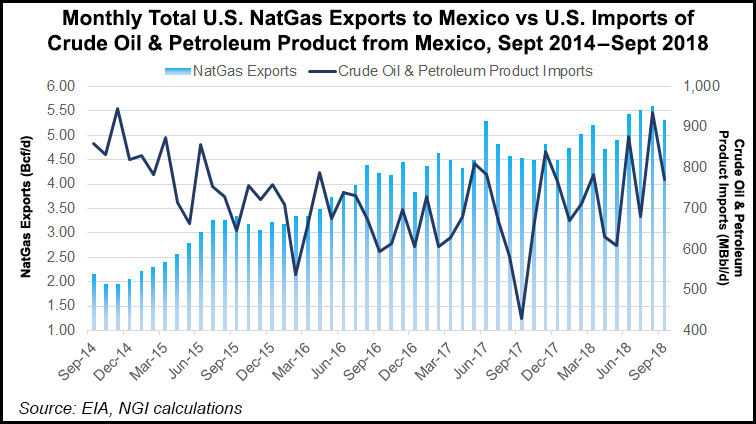Regulatory | NGI All News Access
Despite Anti-trade Rhetoric, New Trade Deal to Favor U.S.-Mexico Energy Trade
Despite the fact that Mexico’s new president, Andrés Manuel López Obrador, has been critical of the country’s increasing reliance on hydrocarbons imports, the recently signed United States-Mexico-Canada Agreement (USMCA) should benefit burgeoning cross-border energy trade.

The agreement, which still requires approval of the U.S. Congress, allows for tax-free transport of raw and refined products across borders.
Oil and natural gas are also included in one of only five economic sectors, including telecommunications and transportation, to keep the investor-state dispute settlement (ISDS) provision of the 24-year-old North American Free Trade Agreement (NAFTA), which the USMCA is intended to replace. U.S. investors, including oil and gas companies, wanted ISDS to be retained.
Another notable provision of the USMCA is the recognition of Mexico’s “direct, inalienable and imprescriptible ownership of hydrocarbons.”
After months of negotiations, Mexico’s then-president, Enrique Peña Nieto, signed the USMCA with U.S. President Donald Trump and Canadian Prime Minister Justin Trudeau on the sidelines of the G-20 summit in Buenos Aires, Argentina, last Friday. López Obrador was inaugurated the next day.
During his inauguration speech, López Obrador was particularly critical of the energy reforms enacted by Peña Nieto. But on Wednesday, the new president offered a three-year “truce” to oil and gas companies that won exploration and production contracts through bid rounds under his predecessor.
Tariffs Still On Table
From the start of negotiations, auto manufacturing had a high profile. Under the USMCA, 75% of a vehicle’s value must be produced in North America, versus 62.5% under NAFTA, and 40-45% of a car must be produced in factories where workers are paid at least $16/hour. For now, a 25% tariff on steel and a 10% tariff on aluminum imported from Canada and Mexico remains in effect.
Still, the trade pact was signed four days after General Motors Co. (GM) announced that it would close factories in the United States and Canada, eliminating up to 14,800 jobs. Trudeau called the GM news “a heavy blow” to both nations, but he also used it as an opportunity to prod Trump over the ongoing tariffs.
“Donald, it’s all the more reason why we need to keep working to remove the tariffs on steel and aluminum between our countries,” the Canadian leader said.
The White House enacted the steel and aluminum tariffs in June. At the time, Commerce Secretary Wilbur Ross said the decision to impose the tariffs was made because of insufficient progress in renegotiating NAFTA. But Ross was reportedly absent from the signing ceremony and the G-20 summit altogether, leading to speculation about his future in Trump’s cabinet.
Approval By U.S. Congress Not Assured
In Washington, DC, lawmakers on both sides of the aisle began to line up in support — and opposition — to the trade pact.
“For the new trade agreement to receive a majority support in Congress — including from members like myself, who have long opposed NAFTA and demanded improvements — it must prove to be a net benefit to middle-class families and working people in our country and must have strong labor and environmental protections, which in the present deal are too weak,” said Senate Minority Leader Chuck Schumer (D-NY).
However, in a letter to the White House, 12 Republican senators said they “stand ready to assist” Trump in getting Congress to approve the USMCA, but they also urged the president to act quickly.
“We are concerned that if the administration waits until next year to send to Congress a draft implementing the bill, passage of the USMCA as negotiated will become significantly more difficult,” the GOP senators penned in their Nov. 20 letter.
U.S. Trade Representative Robert Lighthizer reportedly said the Trump administration planned to work with Congress to get its approval.
“The negotiations are not going to be reopened, the agreement has been signed,” Lighthizer said, according to reports. “We still need to put together an implementing bill so there are things that we can do. But I want to remind everyone that this was negotiated from the beginning to be a bipartisan agreement. It was the president’s instruction to me from the beginning that he wants a bipartisan agreement.”
Lighthizer also reportedly said “a very high number of Democrats” support the USMCA. “I’ve been in discussions with a variety of Democratic leaders…and they’ll be very much involved in the process moving forward and will have an influence, a strong influence,” he said.
The United States and Mexico agreed to the USMCA in August, and Canada joined the trade pact in September.
© 2024 Natural Gas Intelligence. All rights reserved.
ISSN © 2577-9877 | ISSN © 2577-9966 |
